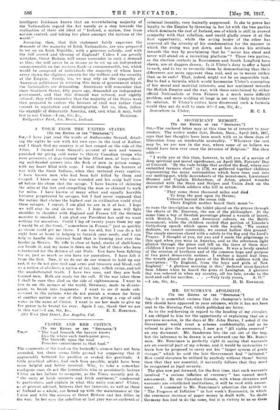ULSTER AND HER CRITICS. [To THE EDITOR or THE "SPECTATOR.")
FIR; " The toad beneath the harrow knows Exactly where each tooth-point goes; The butterfly upon the road
Preaches contentment to that toad."
The comments a the toad on the butterfly's sermon have not been lecorded, but there seems little ground for supposing that it appreciably bettered his position or evoked his gratitude. A little practical advice, had such been possible, might have been inure helpful and better received. Why, to take a somewhat analogous MSC, do not the journalists who so persistently lecture 'Ulster on her failure to recognize, as the Times recently put it, " the unity of Irish interests and Irish sentiment," condescend to particulars, and explain in what this unity consists? Ulster, at at present advised, believes that her interests, as well as those ef Ireland as a whole, are bound up with the maintenance of the Union and with the success of Great Britain and her Allies in the war. In her es es the rebellion of last year was an outbreak of
criminal insanity, very leniently suppressed. Is she to prove her loyalty to the Empire by throwing in her lot with the two parties which dominate the rest of Ireland, one of which is still in avowed sympathy with that rebellion, and would gladly renew it at the first opportunity, while the acting leader of the other has reserved all the severity of his condemnation for the manner in which the rising was put down, and has shown his attitude towards the war by proclaiming that he "never has stood and never will stand on a recruiting platform"? These two parties, as the election contests in Roscommon and South Longford have shown, are at daggers drawn. Is it Ulster's duty to offer a hand ta each, and to try to reconcile them by demonstrating that their differences are more apparent than real, and as to means rather than as to ends? That, indeed, might not be an impossible task. But to find a formula which would harmonize Ulster's conception of her moral and material interests, and her sentiment towards the British Empire and the war, with those entertained by either official Nationalists or Sinn Feiners is a much more difficult problem, and mere scolding at large is not very likely to further its solution. If Ulster's critics have discovered such a. formula would they not do well to state it?—I am, Sir, de.,


























 Previous page
Previous page